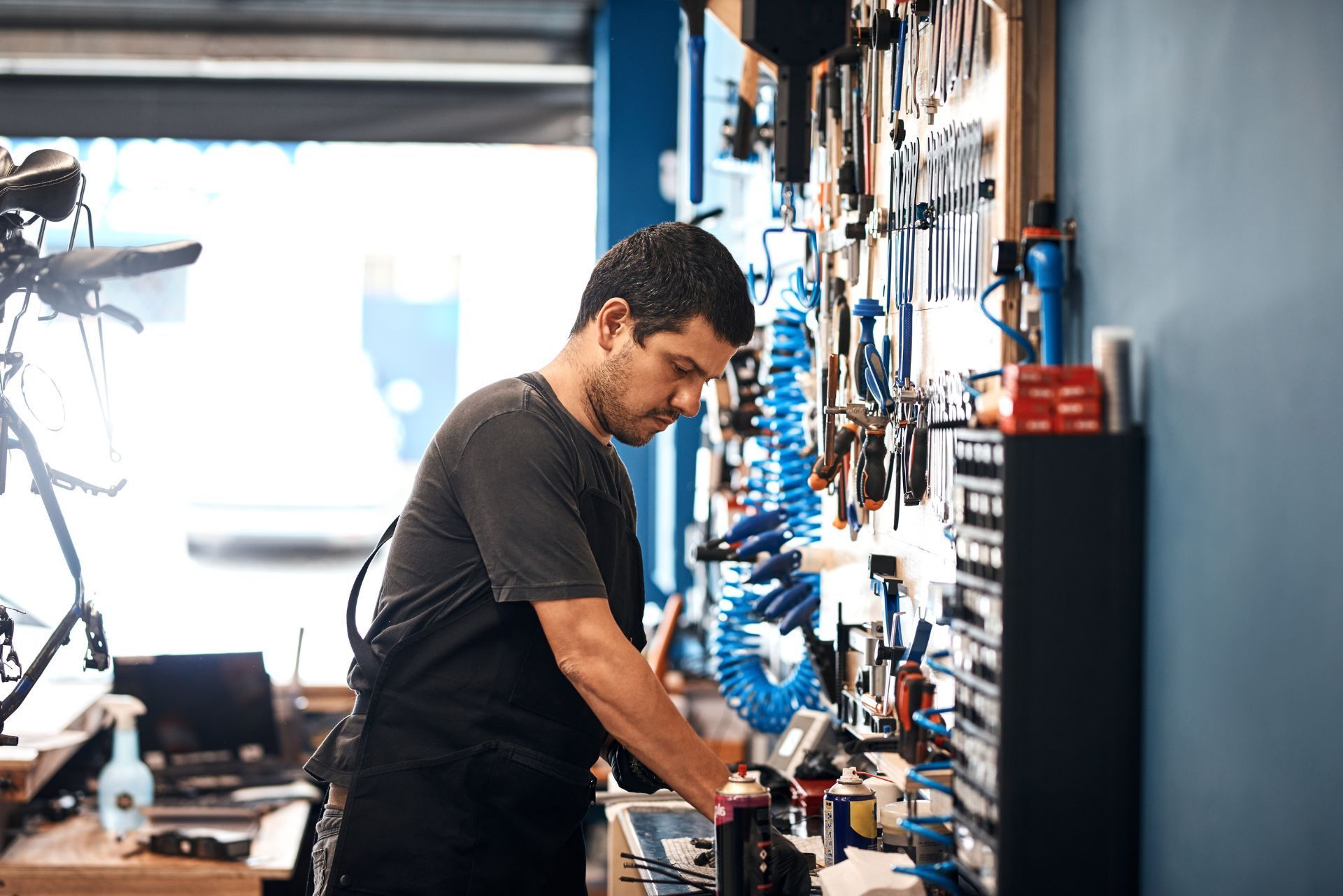Independent Repair Shop Insurance in California

9:00am - 6:00pm Mon-Fri
Will Reply in 15min*
Top 3 Recommended Policies
Index
Understanding the Importance of Insurance for Repair Shops
Different Types of Insurance for Independent Repair Shops
Key Factors to Consider When Choosing Insurance
Independent repair shops play a crucial role in providing repair and maintenance services for various types of equipment and vehicles. As a business owner in this industry, it is important to understand the risks associated with running a repair shop and the importance of having the right insurance coverage to protect your business. This article will discuss the different types of insurance that independent repair shops should consider, key factors to consider when choosing insurance, and the process of getting insured.

Understanding the Importance of Insurance for Repair Shops
For independent repair shops, insurance serves as a vital component in protecting your business from potential risks and liabilities. Whether you specialize in automotive repairs, electronic repairs, or any other type of repair service, there are inherent risks involved in the daily operations of your business. Having the right insurance coverage helps mitigate these risks and provides financial protection in case of unforeseen events or accidents.
The Role of Insurance in Business Protection
Insurance plays a critical role in safeguarding your repair shop from potential lawsuits, property damage, or other liabilities. It provides coverage for legal expenses, property repairs, equipment replacement, and potential loss of income due to business interruption. Without adequate insurance, repair shop owners expose themselves to significant financial risks, which can lead to bankruptcy or closure of their business.
Why Independent Repair Shops Need Insurance
Repair shops face a myriad of risks that can impact their operations and financial stability. Accidents can occur during repairs, leading to injuries or property damage. Customers may also file lawsuits claiming faulty repairs or negligence. Additionally, equipment breakdowns, natural disasters, or theft can disrupt business operations and lead to substantial financial losses. Having insurance coverage ensures that repair shop owners are protected against such risks and can continue their business operations without major setbacks.
One of the key risks that repair shops face is the potential for accidents during repairs. Whether it's a slip and fall incident or an equipment malfunction, accidents can happen unexpectedly. Without insurance, repair shop owners may be held liable for any injuries sustained by employees or customers. This can result in costly legal battles and hefty compensation payouts, which can cripple a business financially.
Another risk that repair shops need to consider is the possibility of property damage. Repair shops often house expensive equipment and tools, which can be damaged due to fire, water leaks, or natural disasters. Without insurance coverage, repair shop owners would have to bear the cost of repairing or replacing damaged property, which can be a significant financial burden.
In addition to accidents and property damage, repair shops also face the risk of customer lawsuits. If a customer is dissatisfied with the quality of repairs or believes that negligence led to further damage, they may take legal action against the repair shop. Insurance coverage can help cover the legal expenses involved in defending against such lawsuits and provide compensation to the customer if necessary.
Furthermore, repair shops are susceptible to business interruptions caused by equipment breakdowns, natural disasters, or theft. These events can disrupt operations and lead to a loss of income. With insurance, repair shop owners can receive compensation for the income lost during the interruption period, allowing them to maintain financial stability and continue serving their customers.
Overall, insurance is a crucial investment for repair shop owners. It provides financial protection against a wide range of risks and liabilities, ensuring that the business can withstand unforeseen events and continue operating smoothly. By having the right insurance coverage, repair shop owners can focus on providing quality repairs and services to their customers, knowing that they are protected from potential financial ruin.
Different Types of Insurance for Independent Repair Shops
Independent repair shops should consider multiple types of insurance coverage to adequately protect their business. The following are some of the key types of insurance that every repair shop owner should have:
General Liability Insurance
General liability insurance covers third-party bodily injuries or property damage that occur on your premises or as a result of your business operations. It provides coverage for legal expenses, medical costs, and potential settlements or judgments against your repair shop.
For example, imagine a customer slips and falls in your repair shop due to a wet floor. With general liability insurance, you can rest assured knowing that any medical expenses incurred by the customer will be covered. Additionally, if the customer decides to file a lawsuit against your repair shop, the insurance will also cover the legal expenses involved.
Property Insurance
Property insurance protects your repair shop's physical assets, including your building, equipment, tools, and inventory, in case of damage or loss due to fire, theft, vandalism, or natural disasters. Having property insurance ensures that you can repair or replace your assets without significant financial burdens.
Let's say a fire breaks out in your repair shop and damages all of your equipment and inventory. Without property insurance, the cost of replacing these items could be overwhelming and potentially bankrupt your business. However, with property insurance, you can recover from such incidents and continue providing repair services to your customers.
Workers' Compensation Insurance
Workers' compensation insurance is essential if you employ workers in your repair shop. It provides coverage for medical expenses, lost wages, and disability benefits in the event that an employee is injured or falls ill due to work-related activities. Workers' compensation insurance protects both your employees and your business.
Consider a scenario where one of your employees injures their hand while operating a power tool. Without workers' compensation insurance, you would be responsible for covering their medical expenses and lost wages. This could put a strain on your business finances. However, with workers' compensation insurance, these costs are taken care of, allowing your employee to receive the necessary medical treatment and compensation while minimizing the financial impact on your repair shop.
Business Interruption Insurance
Business interruption insurance compensates for lost income and ongoing expenses in case your repair shop is temporarily unable to operate due to a covered event, such as a fire or natural disaster. It helps to cover fixed costs such as rent, utilities, and employee wages, ensuring that your business can recover and continue operations as quickly as possible.
Imagine a severe storm damages the roof of your repair shop, making it unsafe for customers and employees to enter. As a result, you are forced to close your business temporarily. During this time, you still have to pay rent, utilities, and salaries to your employees, even though you are not generating any income. Business interruption insurance provides the necessary financial support to cover these expenses, allowing you to focus on repairing your shop and reopening for business.

Key Factors to Consider When Choosing Insurance
When selecting insurance for your independent repair shop, there are several key factors to consider:
Assessing Your Business Risks
Identify the specific risks associated with your repair shop. Consider the type of repairs you specialize in, the equipment you use, and the potential liability exposures. A thorough risk assessment will help determine the types and levels of coverage needed for your business.
For example, if your repair shop specializes in high-end luxury cars, you may face a higher risk of theft or damage to expensive parts. On the other hand, if you primarily work on older vehicles, you may have a higher risk of liability claims due to potential mechanical failures.
Additionally, consider the location of your repair shop. If it is located in an area prone to natural disasters such as hurricanes or earthquakes, you may need additional coverage to protect against property damage.
Understanding Insurance Policy Terms
Insurance policies can contain complex terms and conditions. It is crucial to fully understand the coverage limits, exclusions, deductibles, and other policy provisions. Seek professional advice if needed to ensure that you have a clear understanding of what your insurance policy covers.
For instance, some insurance policies may have exclusions for certain types of repairs or may require additional coverage for specialized equipment. Understanding these terms will help you avoid any surprises or gaps in coverage when you need to file a claim.
Furthermore, it is important to review the claims process outlined in the policy. Knowing how to file a claim and what documentation is required can help streamline the process and ensure a smoother experience in the event of a loss.
Evaluating Insurance Costs and Benefits
Comparing insurance costs and coverage is important to ensure you get the best value for your money. Consider factors such as deductibles, premium rates, and the financial strength of the insurance provider. Balance the costs against the potential benefits and protection provided by the insurance policies.
When evaluating insurance costs, it is essential to look beyond the premium rates. Consider the deductibles, which are the out-of-pocket expenses you will need to pay before the insurance coverage kicks in. A higher deductible may result in lower premium rates but could also mean a higher financial burden in the event of a claim.
Additionally, research the financial strength and reputation of the insurance provider. You want to ensure that the company has a solid track record of paying claims promptly and fairly. Look for customer reviews and ratings to gauge the level of satisfaction among policyholders.
Furthermore, consider the benefits offered by the insurance policies. Some policies may include additional perks such as roadside assistance or coverage for rental vehicles while your shop is undergoing repairs. These benefits can add value to your insurance coverage and provide peace of mind.
By carefully assessing your business risks, understanding insurance policy terms, and evaluating costs and benefits, you can make an informed decision when choosing insurance for your independent repair shop. Remember to regularly review your coverage to ensure it aligns with any changes in your business operations or industry regulations.
The Process of Getting Insured
Acquiring insurance for your independent repair shop involves several steps:
Finding the Right Insurance Provider
Research and compare insurance providers that specialize in insurance for repair shops. Look for providers with experience in the industry and a solid reputation. Read customer reviews and consult with other repair shop owners to get recommendations.
Applying for Insurance Coverage
Once you have selected an insurance provider, you will need to complete an application for insurance coverage. Provide accurate and detailed information about your repair shop, its operations, and the desired coverage. The insurance provider will evaluate the application and determine your premium rates and coverage options.
Maintaining and Updating Your Insurance
After obtaining insurance coverage, it is crucial to regularly review and update your policies as your business grows and changes. Inform your insurance provider of any significant changes to your repair shop to ensure that you maintain adequate coverage.
In conclusion, independent repair shops need proper insurance coverage to protect their business against potential risks and liabilities. General liability insurance, property insurance, workers' compensation insurance, and business interruption insurance are some of the key types of insurance to consider. When choosing insurance, assess your business risks, understand policy terms, and evaluate costs and benefits. Lastly, follow the necessary steps to find the right insurance provider, apply for coverage, and maintain and update your insurance as needed. With the right insurance coverage in place, independent repair shop owners can have peace of mind and focus on growing their business with confidence.



